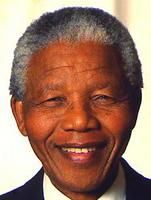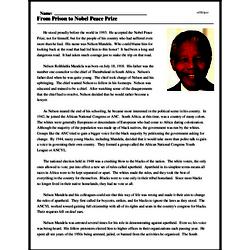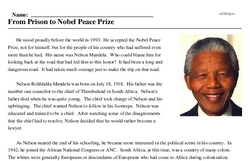From Prison to Nobel Peace Prize
He stood proudly before the world in 1993. He accepted the Nobel Peace Prize, not for himself, but for the people of his country who had suffered even more than he had. His name was Nelson Mandela. Who could blame him for looking back at the road that had led him to this honor? It had been a long and dangerous road. It had taken much courage just to make the trip on that road.
Nelson Rolihlahla Mandela was born on July 18, 1918. His father was the number one councilor to the chief of Thembuland in South Africa. Nelson's father died when he was quite young. The chief took charge of Nelson and his upbringing. The chief wanted Nelson to follow in his footsteps. Nelson was educated and trained to be a chief. After watching some of the disagreements that the chief had to resolve, Nelson decided that he would rather become a lawyer.
As Nelson neared the end of his schooling, he became more interested in the political scene in his country. In 1942, he joined the African National Congress or ANC. South Africa, at this time, was a country of many colors. The whites were generally Europeans or descendants of Europeans who had come to Africa during colonization. Although the majority of the population was made up of black natives, the government was run by the whites. Groups like the ANC tried to gain a bigger voice for the black majority by petitioning the government asking for change. By 1944, many young blacks, including Mandela, decided that it would take more than polite talk to gain a voice in governing their own country. They formed a group called the African National Congress Youth League or ANCYL.
The national election held in 1948 was a crushing blow to the blacks of the nation. The white voters, the only ones allowed to vote, put into effect a new set of rules called apartheid. Apartheid in its simplest terms means all races in Africa were to be kept separated or apart. The whites made the rules, and they took the best of everything in the country for themselves. Blacks were to vote only in their tribal homeland. Since most blacks no longer lived in their native homelands, they had no vote at all.




